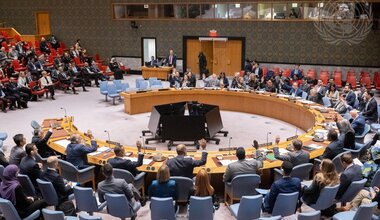UNHCR steps up help during Ramadan for displaced Libyans, refugees and asylum seekers, as war and Coronavirus make life harsher
TRIPOLI, 3 May 2020 - UNHCR has begun a series of extra emergency distributions in Tripoli, to assist some of the most vulnerable people during Ramadan, and as war and COVID-19 present new threats.
The first distribution got underway on Sunday, targeting more than 100 asylum seekers and refugees living in overcrowded conditions with insufficient water and sanitation, in a popular neighbourhood of Tripoli. Many among them had been previously held in detention and were only recently released. People here have told staff that while they had managed to find basic daily labouring work before, this had dried up because of movement restrictions related to the outbreak of the COVID-19 pandemic.
The assistance package being distributed includes hygiene kits, purification tablets, provided by sister agency, UNICEF, and a food basket (designed for one month).
The distribution is the first of a series planned during Ramadan. In the first week, nearly 500 people will be reached with assistance. The aim is to reach up to 4,000 persons during the Ramadan period.
“We recognise that daily life in Libya is terribly difficult, for Libyans as well as for refugees and asylum-seekers, because of the armed conflict, and the situation has become even more challenging because of the curfew and movement restrictions induced by the fight against COVID-19”, said Jean-Paul Cavalieri, Chief of Mission for UNHCR in Libya.
“This has especially affected refugees and asylum seekers, who are now unable to find work and earn to support themselves. Ramadan is an important moment to show solidarity at a time when people are really struggling with their daily needs.”
Distributions have been organised in co-ordination with the local relevant authorities and partners, LibAid, the International Rescue Committee, and UN OCHA, to ensure social distancing and the security and safety of individuals receiving assistance.
Meanwhile, UNHCR also continues its ongoing support to the Libyan authorities and displaced Libyans during the COVID-19 pandemic.
The ongoing conflict has severely impacted the country’s health system and medical services, which have limited resources and face shortages of basic equipment and medicines. Many hospitals or health facilities, located in areas close to the conflict, have also been damaged or closed.
UNHCR and partners have been providing generators, ambulances, prefab-containers and tented clinics in support of local healthcare services across the country. Core relief items have been distributed to the health authorities in Misrata, and soap has been distributed in settlements to reach 20,000 displaced people in Benghazi as well as in several detention centres, where hygiene conditions are very poor. Other distributions have taken place for displaced communities in Tripoli.
UNHCR and partners have conducted public health awareness amongst refugees, asylum seekers and Libyans, through posters, text messages and social media, aimed at mitigating the risks of exposure to COVID-19.
UNHCR echoes the appeal of the UN Secretary-General António Guterres urging warring parties across the world to cease their fighting in support of the response to the threat of the COVID-19 pandemic.
Media contacts:
In Tripoli: Tarik Argaz argaz@unhcr.org; +218 91 002 1607
In Tunis: Caroline Gluck gluck@unhcr.org; +216 299 255 06
 United Nations Peacekeeping
United Nations Peacekeeping UN
UN









